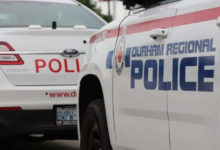Closed borders leading to more dangerous street drugs: OPP
Provincial police say the closure of the Canada-U.S. border during the COVID-19 pandemic has driven up the price of illicit street drugs and driven down the quality of what is being sold in eastern Ontario.
Street-level dealers also seem to be stretching their supplies further, mixing dangerous drugs that can lead to irreversible overdoses, police say.
“We’ve seen our traffickers actual modify their ways of doing business,” said OPP Det. Const. Daniel Dubé of the major crime unit of the Ontario Provincial Police.
“They will stop [at] nothing, they will adjust.”
Dubé said that in the months since COVID-19 closed the border between New York State and Quebec, the drug trade in eastern Ontario has had to adapt.
“They are motivated by money, by profit, and they will not slow down because of [the border] measures.”
Last fall, a kilogram of cocaine could sell for between $45,000 and $50,000, he said. However, since the start of the COVID-19 pandemic, the same quantity has traded on the street for more than $70,000.
The pressure the pandemic has put on supply has lowered the quality of cocaine, he said, with the purity falling from 90 per cent in pre-COVID times to 70 per cent.
Collateral effects?
When drugs make it to street level, the purity falls even more, said Dubé.
Earlier this month, the Eastern Ontario Health Unit issued a warning about the prevalence of “purple heroin” in the Cornwall, Ont., area.
“People are desperate … really taking whatever they can,” said Dr. Paul Roumeliotis, medical officer of health and CEO of the Eastern Ontario Health Unit.
In seized purple heroin samples, a drug which is normally heroin laced with fentanyl, the sedative etizolam has also turned up.
A medication from the benzodiazepine family, etizolam, or “benzos” as they are called on the street, functions as a central nervous system depressant.
Overdoses of etizolam can cause dangerously slow breathing that may lead to overdose and death.
More worryingly, since it is not an opioid, it does not respond to naloxone, the medication normally used to reverse the effect of opioid overdose.
In an email, a spokesperson for Ottawa Public Health said overdoses were a continuing problem in Ottawa, too.
“Our message,” said Roumeliotis, “is please do not use anything off the streets.”
CBC








Redes Sociais - Comentários